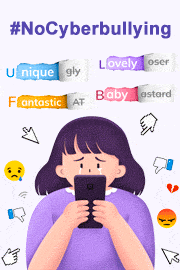How You Can Help Stop Cyberbullying
Do you know what a bystander is? It’s someone who watches an event taking place from the side lines. They do not interact or take part in what is happening. People talk a lot about cyberbullies and their victims. One part of this social ill that people rarely talk about is how bystanders effect the situation. Some researchers call them “cyberbystanders.”
Cyberbystanders are those who watch cyberbullying while it happens. They are the other people in chat rooms or on social media apps who can read the posts that the bully posts to the victim. Yet, they don’t do anything to help stop it.
Are you a Cyberbully Bystander?
Cyberbystanders can be middle-school kids, college students or even business associates. These people will watch the exchange and have a chance to speak up. But do they?
Many studies have been done to see exactly what happens to cyberbystanders. A university study found that only one out of ten cyberbystanders will take a stand during the exchange. The action these people take is usually limited to posting support for the victim or posting comments that the bully should back off.
Most of the time, though, cyberbystanders do nothing. The studies seem to show that cyberbystanders didn’t want to get the middle of a situation that was none of their business. They didn’t seem to make the connection that they were on a public site—making everything that happened there public.
Some of the cyberbystanders who did nothing during the bullying did take action afterwards. They sent comments to moderators or to the site’s security officers. Moderators and site security can remove offending posts and even ban bullies from the site.
Cyberbullying Prevention
Companies are taking cyberbullying more seriously these days and will often respond to comments within hours. This can help prevent further bullying, but still doesn’t make a difference to the victim of the bullying that’s already happened.
Cyberbystanders online act much like real-life bystanders. When an accident happens on the street, if there are lots of people watching, then people are less likely to help. In other words, the more witnesses there are, the fewer people will help.
That is the same online. If lots of people are watching the posts and tweets, the less likely someone will step in and defend the victim or criticize the bully. If only a couple people are reading the posts—or witness the accident—the more likely they are to step in and help. On the other hand, the more people that are following an ugly exchange online, the more brutal the bully will be. It seems that bullies like an audience.
Social scientists are still trying to understand the difference cyberbystanders make to online communication. What you can do is remember that you are probably a cyberbystander. Talk with your teachers, friends or family about what you should do when you see bullying happen online. Don’t be one of the nine out of ten who does nothing.
Protection Against Bullys
While efforts to prevent and address bullying primarily focus on awareness, education, and support, it is essential to parent may need to consider the legal steps to protect their children. Understanding the legal options available can empower parents to effectively advocate for their children’s well-being and create safer environments both at school and online.
Familiarizing yourself with anti-bullying laws and policies locally and nationally is a start. Legislation varies from region to region, but many jurisdictions have enacted laws that specifically address bullying in schools. These laws often define what constitutes bullying, outline reporting mechanisms, and establish disciplinary procedures. By becoming knowledgeable about the legal framework in their area, parents can better navigate the system and ensure that schools are held accountable for addressing bullying incidents promptly and appropriately.
In cases where school interventions prove insufficient or ineffective, parents may consider seeking legal remedies such as restraining orders or protective orders against the individuals involved in bullying. These orders can help safeguard their children from further harm by legally prohibiting the bullies from making any contact or engaging in any harmful behaviors. While obtaining such orders typically requires providing evidence of ongoing harassment or threats, they can provide an added layer of protection and peace of mind.
Bullying First Aid when you are Bullied
Are you being bullied, whether on the playground or online? We know it hurts. Have you heard these hurtful words?
“You’re stupid, fat and ugly. In hockey that’s called a hat trick.” And the kids around the bully giggle. For a split-second you almost laugh. The insult is kind of funny. Or, it would be if it hadn’t been aimed at you. But the insult is aimed at you. And there you are, verbally slapped.
A mess of ideas run through your head. Run. Cry. Yell an insult back — but you’re flustered and the words stick in your head and mouth.
You need to be prepared to handle the situation at the moment that it happens. You need bullying first aid.
The first rule of bullying first aid is this:
IF YOU ARE ALONE OR AN UNCOMFORTABLE DISTANCE FROM A PUBLIC AREA, DO NOT LASH OUT OR BE INSULTING. SAY SOMETHING SOFT, LIKE “I’M SORRY YOU FEEL THAT WAY,” OR “I GUESS THAT’S YOUR OPINION.” THEN LEAVE. WALK CALMLY, BUT FIRMLY. DON’T TAKE A CHANCE OF BEING INVOLVED IN A PHYSICAL ASSAULT.
That said, if you are close enough to other people or have friends around you, you have options. The best option is a strategy that is both confusing to the bully and takes away all the power of his or her insult: Be nice. Be really, really nice.
How to Respond to a Bully
- “That’s pretty funny. Do you have any more lines?”
- “You remind me of those comedy roasts. Have you thought of doing comedy?”
- “I wish I could stay and hear more, but I have to go. Thanks for the laugh, though.”
Being nice is a great way to show the bully that his or her words don’t have the desired effect. A bully wants you to be scared, cry or show weakness. When you show the bully that the words don’t work on you, he or she has lost.
But you must be careful.
If you see any sign that the bully is so frustrated with your niceness that violence could happen, go back to the first rule and softly excuse yourself.
The key to performing truly effective bullying first aid is to practice.
Enlist your best friend or even a parent or sibling to play the role of the bully. Have that person really get into the role (pretending that they are the villain in a movie). Try different responses.
And most definitely practice the number one rule: IF YOU THINK YOU COULD BE IN PHYSICAL DANGER, GIVE A SOFT RESPONSE AND LEAVE.
Additional Bullying Resources:
- Learn how you you can stand up against a cyberbully, read our article on CyberBullying Guide for Kids and Teens.
- Parents and Teachers, read our article on CyberBullying Guide written for Parents.










